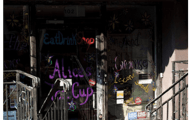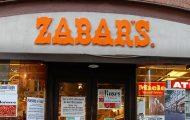Passing the discreet storefront of Acker Wines at 160 West 72nd Street, there’s no clue as to the unusually long history of this family business of wine merchants, which has evolved and thrived in New York over the past 200 years. And, while the first locations were downtown, Acker Wines, earlier known as Acker Merrall & Condit, had a store at 76th and Columbus in 1904. It was then one of eight high-end grocery stores in Manhattan and Brooklyn. A promotional brochure of the time stated that “The 76th Street store covers all territory from Sixty-eighth Street to Ninety-first Street, Central Park West to North River.”
As evocatively described in a recently published book by Kenneth Durr, The Story of Acker, The 200-Year History of America’s Oldest Wine Shop, “the roots of Acker Merrall & Condit are found deep into (the) 18th Century and the gentle, heather covered hills of southwestern Scotland in the region of Dumfries.”
Advertisement
Some years later, three clerks would join the business: John Condit, William Merrill and David Acker. They would eventually become partners.
The business grew and they started to acquire real estate. They also started offering an increasingly large selection of coffees, teas and specialty foods, in addition to luxury items such as “rare old wines, pickles, sauces, catsups, mustard, sweet oil, sardines & a general assortment of provisions.” Partnering with another enterprise, the firm continued to prosper.
By the end of the Civil War (1865), imports had increased and the business expanded. A purchasing agency was opened in Paris.
Thomas Hope & Company became Acker, Merrall & Company on February 1st, 1858. Condit’s name was added in 1868.
The business survived the domestic financial turmoil of the 1870s, “for in catering mostly to the city’s elite, the firm was able to remain above the vicious fight for Gilded Age fortunes and the specter of growing urban poverty.” A reputation for fine wines and cigars supported the opening of a 57th Street store in the 1880s, convenient for owners of opulent nearby mansions on Fifth Avenue. By then, 300 people were employed by the company. A larger store opened on 42nd Street in 1894, and the expansion of smaller stores continued to other parts of the city and the suburbs.
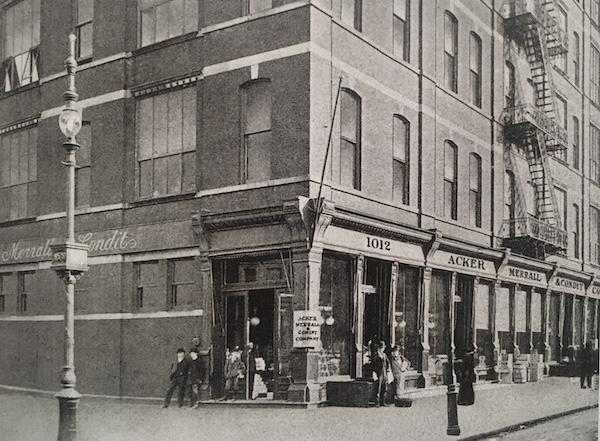
An Acker retail store on West 42nd Street, first opened in 1894
The firm growth slowed and by 1918, it was minus 26 stores. Recovering from this troubled period, Acker again had to adapt to change in the 1930s to conform with a new state law which only allowed “each corporate entity one liquor license in a municipality.” At that point, they opened the store at 2377 Broadway, while also investing in becoming specialists in French wines.
Management of the business came to William Kapon, one of the business partners who worked behind the counter.
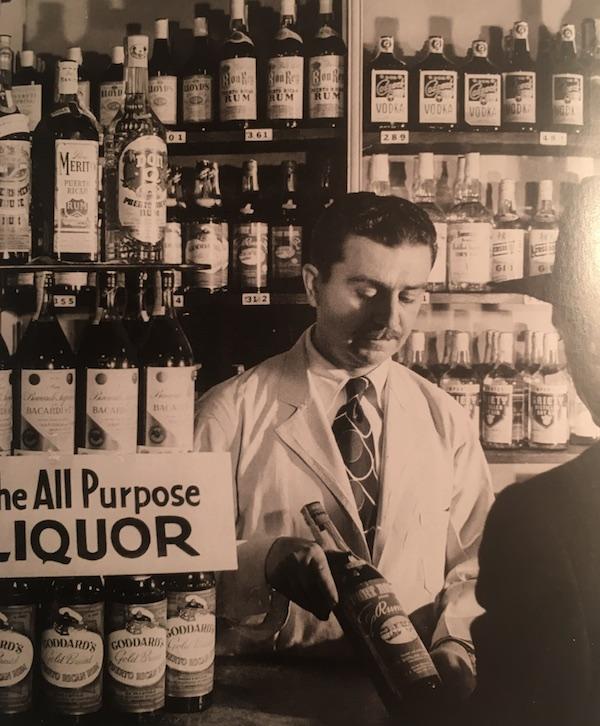
William Kapon at 2377 Broadway in 1943
Kenneth’s book digs into the celebrity clientele Acker attracted with its UWS storefront.
“Since it was the Upper West Side, a few of those valued customers were celebrities. Babe Ruth came by until his death in the late 1940s. Actor and comedian Zero Mostel was a regular during his days on Broadway’s Blacklist and during his sixties stardom, as was Fred Gwwynne, who patrolled New York for television viewers everywhere in the 1960s sitcom “Car 54, Where Are You?”
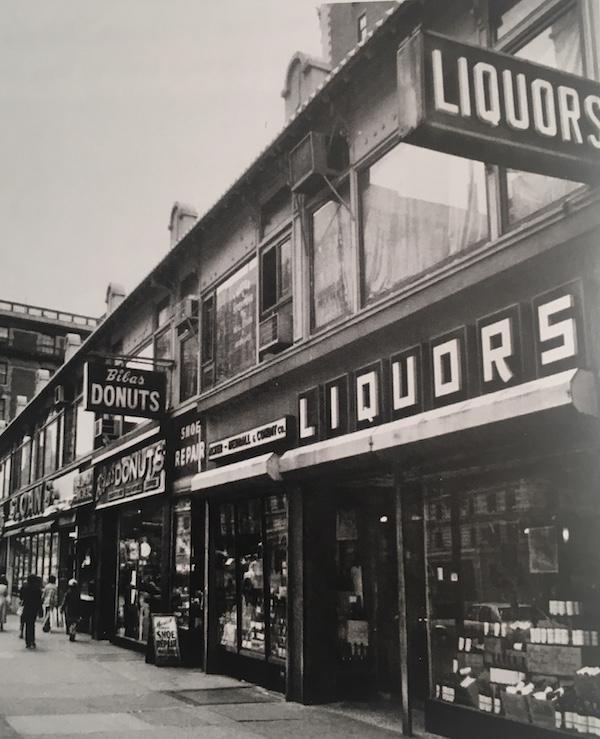
Acker soon moved a couple doors down – to 2373 Broadway – which remained open until 1987
Among William’s two sons, Michael had the greatest interest in running the business, which was now specializing in high quality wines with less focus on gourmet foods.
In 1987, Michael Kapon brought the business to 160 West 72nd Street as the base of operations. John Kapon, the oldest of Michaels three sons, came to work in the business at the age of 22 in 2004. In 1997, he initiated the specialty of auctioning wine, an activity in which he is now an expert.
All this and more is chronicled in Durr’s writings. For more information about the anniversary book, please contact Acker Wines here.
Advertisement
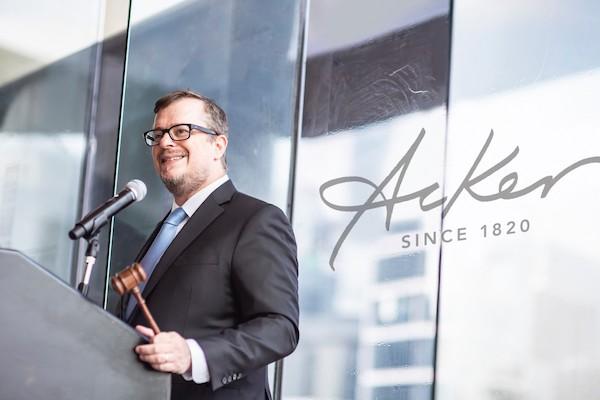
John Kapon
1. What makes a good auctioneer?
A common stereotype about auctioneers is that it’s all about the numbers, but, in my experience, it’s also about connecting. A good auctioneer is well-educated on what he or she is selling so that the auction feels less inherently about the transaction, and more conversational with the buyers in the room. Above all, an auctioneer’s job is to hold the crowd and get the room excited. A strong dose of humor, familiarity and friendly banter never hurts. Plus, there’s always wine at an Acker auction; that helps an auctioneer be more entertaining!
2. Why do you enjoy this part of the wine business?
Acker wine auctions are about bringing people together to taste wine and share a meal — the sales component is the cherry on top. The people are what make the business great, sharing the same passion with so many different wine lovers from so many places. Virtual tastings have helped us accomplish this important component, even during quarantine.
3. How would someone interested in buying at an auction learn what/how to purchase?
The online auction game allows newer collectors a more accessible point of entry for auction buying. The lots are smaller and typically less expensive. Learning about bottle conditions is important in becoming a savvy auction buyer.
Advertisement
4. How are American tastes evolving? Looking forward, is there a type of wine that you think is particularly promising?
The number one way American tastes or palates are evolving is by drinking more wine. Drinkers are becoming better educated about the myriad styles of wine available around the world. The classic regions, like Burgundy and Bordeaux, will always have a place on American tables and remain the icons of the wine market, but people are seeking out regions that perhaps offer greater value, like Chardonnay from Patagonia, Riesling from Germany or Grenache from the Rhone or Spain. I think American palates are now seeking truly balanced wines versus some of the incredibly intense and concentrated wines that were popular in the early 2000s.
5. How has the business of being a wine merchant evolved since you entered the business?
The wine business has become wholly global over the course of my career. That has to be the biggest change, but we were definitely at the forefront of that shift when we brought wine auctions to Hong Kong over a decade ago. I don’t think that twenty years ago I would have guessed that our third biggest buyer of wines at auction would be Brazilians. Furthermore, I’m glad that the upper echelon of the fine wine market has expanded to include some of the greatest names from Germany, the Northern Rhone, and further afield. These regions were relegated to big mixed lots at low prices twenty years ago, but now we sell single bottles of German Riesling for upwards of $2,000. These previously lesser regions gaining traction has been tremendously exciting to see. Diversity drives the game, keeping the market alive, excited and interesting.
[wpdreams_rpp id=0]
